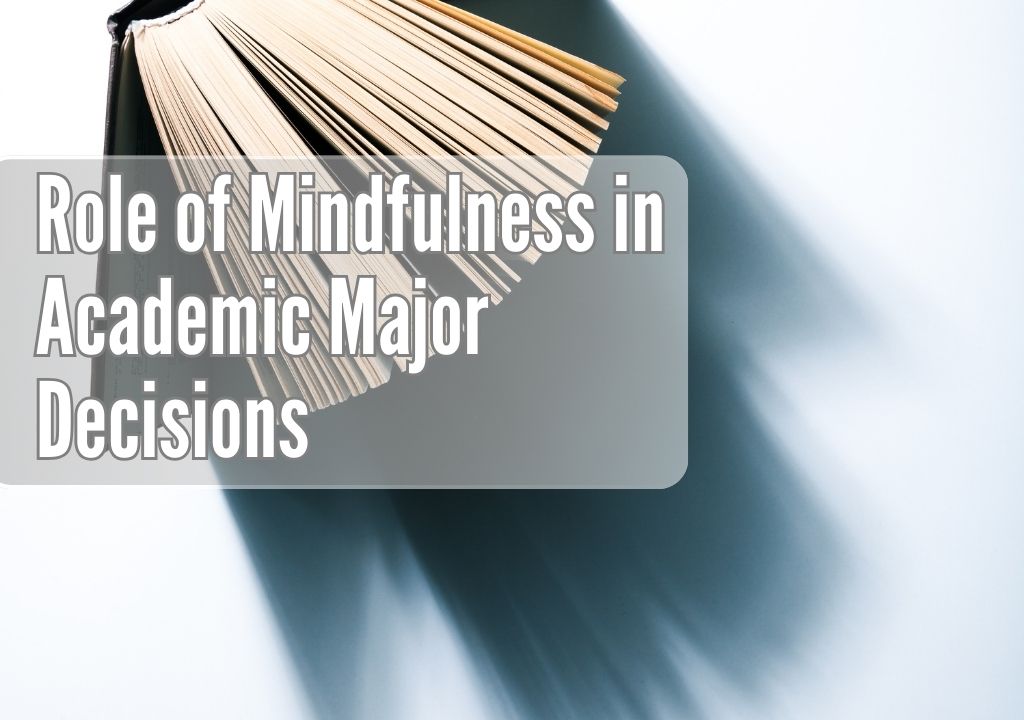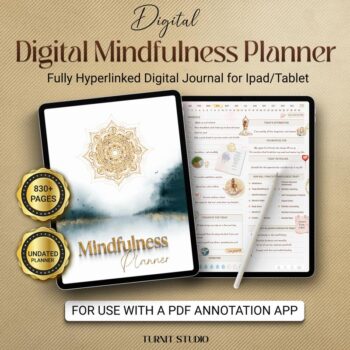Blog
The Significant Role of Mindfulness in Academic Major Decisions

College students face numerous challenges when it comes to making important decisions, such as choosing a major that will shape their future careers. In this context, understanding the role of mindfulness in academic major decisions is crucial. Mindfulness, a tool gaining popularity for its ability to enhance decision-making, holds significant promise for students seeking clarity and satisfaction in their academic major selections.
Understanding Mindfulness
Mindfulness is a concept that has gained popularity in recent years, but what exactly does it mean? In its simplest form, mindfulness is the practice of being fully present in the moment. It involves bringing one’s attention to the present moment without judgment or attachment to thoughts or emotions. By cultivating mindfulness, individuals can develop a greater sense of self-awareness and a deeper understanding of themselves and their surroundings.
Furthermore, mindfulness is not just about being aware of the present moment; it also involves a sense of compassion and kindness towards oneself and others. This aspect of mindfulness is often referred to as loving-kindness or metta meditation, where individuals cultivate feelings of love, compassion, and empathy towards themselves and those around them.
Defining Mindfulness
Mindfulness can be defined as a state of active, open attention on the present moment. It involves observing one’s thoughts and feelings without judging them as good or bad. Instead, mindfulness encourages individuals to acknowledge and accept their thoughts and emotions without getting caught up in them.
Moreover, mindfulness is not limited to formal meditation practices; it can be integrated into everyday activities such as eating, walking, or even washing dishes. This concept of mindfulness in daily life emphasizes the importance of being fully engaged in each moment, no matter how mundane the task may seem.
The Science Behind Mindfulness
Scientific research has shown that practicing mindfulness can have a wide range of benefits. It has been found to reduce stress, improve focus and attention, enhance creativity, and promote overall well-being. In the context of academic major decisions, mindfulness can help students navigate through the complexities of choosing a major while minimizing stress and making more informed choices.
Furthermore, neuroimaging studies have revealed that regular mindfulness practice can lead to structural changes in the brain, particularly in areas associated with emotion regulation, memory, and self-awareness. These findings provide scientific evidence for the transformative power of mindfulness on the brain’s structure and function.
IN THIS ARTICLE
The Importance of Mindfulness in Decision Making
When it comes to making significant choices, such as selecting an academic major, having a clear and focused mind is essential. Mindfulness can play a crucial role in this process by helping individuals develop a deeper understanding of their values, interests, and strengths.
Plus, practicing mindfulness can also enhance one’s ability to stay present and fully engage with the decision-making process. By being fully aware of the present moment without judgment, individuals can avoid being overwhelmed by past regrets or future worries, allowing them to focus on the task at hand with clarity and purpose.
The Connection Between Mindfulness and Clarity
Mindfulness practice can create mental space for individuals to examine their thoughts and emotions related to decision-making. By cultivating an attitude of non-judgmental awareness, students can gain clarity about their preferences and priorities, enabling them to make more informed choices about their academic majors.
Moreover, mindfulness can also help individuals recognize any biases or preconceived notions that may influence their decision-making process. By being mindful of these underlying factors, students can make decisions that are more aligned with their authentic selves, leading to greater satisfaction and fulfillment in the long run.
Mindfulness and Stress Reduction in Decision Making
Decision-making can be a stressful process, especially when it involves important life choices such as selecting an academic major. Mindfulness can help students reduce the stress associated with decision-making by allowing them to approach the process with a calm and centered mindset. By practicing mindfulness, students can better manage any anxieties and make decisions from a place of clarity and self-assurance.
Additionally, incorporating mindfulness practices into daily routines can have long-lasting benefits beyond decision-making. Research has shown that regular mindfulness practice can improve cognitive function, enhance emotional regulation, and boost overall well-being. By developing a habit of mindfulness, students can not only make better decisions in the short term but also cultivate a mindset that supports their growth and success in the long run.
The Role of Mindfulness in Building Resilience
In addition to aiding in decision-making and stress reduction, mindfulness can also help students build resilience in the face of challenges. By practicing mindfulness, individuals learn to observe their thoughts and emotions without judgment, allowing them to develop a greater sense of self-awareness and emotional intelligence. This increased resilience can empower students to navigate obstacles with grace and adaptability, ultimately leading to greater personal and academic success.
Applying Mindfulness to Academic Major Decisions
Now that we understand the importance of mindfulness in decision-making, let’s explore how students can apply mindfulness techniques to the process of choosing an academic major.
When it comes to selecting an academic major, it’s crucial for students to delve deep into their inner selves and truly understand what drives them. This process goes beyond just looking at job prospects or societal expectations; it involves a profound exploration of personal passions, values, and aspirations. By embracing mindfulness, students can embark on a journey of self-discovery that not only shapes their academic path but also their future life choices.
Mindfulness Techniques for College Students
There are several practical mindfulness techniques that students can incorporate into their daily lives to support their decision-making process. These may include mindfulness meditation, deep breathing exercises, body scan practices, or mindful journaling. Engaging in these techniques regularly can help students develop a greater sense of self-awareness and insight.
Mindfulness meditation, for example, can help students quiet their minds and focus on the present moment, allowing them to tune in to their inner thoughts and emotions regarding their academic choices. Deep breathing exercises can serve as a grounding tool, helping students manage any feelings of stress or uncertainty that may arise during the decision-making process. Body scan practices can assist students in becoming more attuned to physical sensations, which can provide valuable cues about their true desires and preferences. Mindful journaling offers students a space to reflect on their thoughts and feelings, enabling them to gain clarity on what truly matters to them when selecting an academic major.
One effective mindfulness technique for major selection is self-reflection. By taking the time to reflect on their own interests, values, and goals, students can gain a better understanding of what truly matters to them. Journaling, meditation, and deep breathing exercises are also valuable tools that can help students quiet their minds and access their intuition when contemplating major choices.
Another powerful mindfulness technique that students can employ is visualization. By visualizing themselves in different career paths related to various majors, students can tap into their emotions and gut feelings about each option. This practice can provide valuable insights into which major aligns best with their authentic selves, helping them make a more informed and fulfilling decision.
Practical Applications of Mindfulness in Academic Major Decisions
In addition to understanding the concepts and benefits of mindfulness in the decision-making process, students can also implement practical tools to integrate mindfulness into their daily lives. One such tool is the use of mindfulness planners, which can provide structure and support for students as they navigate the complexities of selecting an academic major.
Utilizing Mindfulness Planners
A mindfulness planner offer a solution by providing students with a tangible tool to cultivate Mindfulness in Academic Major Decisions, prioritize tasks, and stay aligned with their goals.
Promoting Self-Reflection: Mindfulness planners typically include sections for journaling and reflection, allowing students to pause and contemplate their experiences, thoughts, and emotions. Through regular self-reflection, students can gain insights into their values, strengths, and areas for growth, which can inform their decision-making process.
Setting Intentions: Mindfulness planners often feature sections for setting intentions and goals. By clarifying their intentions for the semester or academic year, students can align their actions with their values and aspirations. Setting intentions mindfully can help students stay focused on what truly matters to them and make decisions that are in line with their long-term goals.
Prioritizing Tasks Mindfully: Mindfulness planners include space for students to prioritize tasks based on their importance and urgency. By approaching task prioritization mindfully, students can discern which activities align with their overarching goals and values, enabling them to make more strategic decisions about how to allocate their time and energy.
Practicing Gratitude: Many mindfulness planners incorporate prompts for practicing gratitude. Cultivating gratitude can help students maintain a positive outlook and perspective, even in the face of challenges or setbacks. By acknowledging the things they are grateful for, students can cultivate resilience and optimism, which can influence their decision-making process in constructive ways.
Managing Stress: Mindfulness planners include features for managing stress, such as breathing exercises, relaxation techniques, and reminders to take breaks. By incorporating stress management practices into their daily routines, students can reduce feelings of overwhelm and anxiety, allowing them to approach decision-making with greater clarity and composure.
Tracking Progress: Mindfulness planners provide space for students to track their progress towards their goals. By monitoring their achievements and milestones, students can gain a sense of accomplishment and momentum, which can bolster their confidence and motivation to continue making positive decisions.
Incorporating mindfulness planners into their daily routines can support students in cultivating a mindset of mindfulness and intentionality, ultimately contributing to their academic success and personal growth.
Overcoming Decision Anxiety with Mindfulness
The fear of making the wrong decision can often lead to decision anxiety. Mindfulness in Academic Major Decisions can assist students in overcoming this anxiety by encouraging them to approach the decision-making process with an open and non-judgmental mindset. By practicing self-compassion and acceptance, students can alleviate the pressure they put on themselves and make decisions with more ease and confidence.
The Impact of Mindfulness on Academic Choices
When considering an academic major, it is essential to align academic interests with personal goals and values. Mindfulness in Academic Major Decisions can aid in this exploration process by encouraging students to reflect on their genuine passions and motivations. By practicing mindfulness, students can connect with their inner selves, gaining a deeper understanding of what truly inspires them.
By cultivating mindfulness in their decision-making process, students can approach their academic major choices with a sense of purpose and authenticity. This intentional approach can lead to a more fulfilling academic journey and set the foundation for a successful career aligned with their values and aspirations.
The Long-Term Effects of Mindful Major Selection
Once an academic major has been chosen, the benefits of mindfulness extend beyond the decision-making process itself. Let’s examine how mindfulness can positively impact individuals in the long run.
When students embark on the journey of selecting a major, they are not just making a decision about their academic path; they are laying the foundation for their future endeavors. The process of mindfully choosing a major involves introspection, research, and self-discovery. It requires students to reflect on their interests, values, and goals, leading to a deeper understanding of themselves and what they hope to achieve in their academic and professional lives.
Through mindful movement practices, individuals can cultivate a deeper appreciation for the capabilities of their bodies and the interconnectedness of physical and mental well-being. Whether practicing gentle yoga poses or engaging in a mindful walk in nature, the focus on breath and movement can help individuals release tension, increase body awareness, and promote a sense of relaxation and vitality. Incorporating mindfulness into movement not only benefits physical health but also nurtures a sense of inner peace and harmony.
Mindfulness and Academic Success
When students choose a major that aligns with their passions and strengths, they are more likely to be motivated and engaged in their studies. This increased focus and dedication can contribute to higher academic success and overall satisfaction with their college experience.
Moreover, a mindful approach to major selection encourages students to explore interdisciplinary connections and diverse perspectives within their chosen field of study. By embracing a holistic view of their major, students can develop a well-rounded understanding of the subject matter, fostering critical thinking skills and creativity that are valuable beyond the classroom.
Mindfulness in Career Satisfaction and Growth
A mindful approach to major selection can also positively influence future career satisfaction and growth. By choosing a major that they are genuinely interested in, students are more likely to pursue careers that align with their values and bring them fulfillment. This alignment between their work and their passions can contribute to long-term career success and happiness.
A mindful approach to major selection can also positively influence future career satisfaction and growth. By choosing a major that they are genuinely interested in, students are more likely to pursue careers that align with their values and bring them fulfillment. This alignment between their work and their passions can contribute to long-term career success and happiness.
Cultivating Mindfulness Beyond College
Mindfulness is a lifelong practice that can continue to benefit individuals long after they have chosen their academic major.
As individuals transition from college into the professional world, the practice of mindfulness takes on new dimensions. Beyond the academic setting, mindfulness can help individuals navigate the complexities of the workplace, manage stress, and foster healthy relationships with colleagues. By incorporating mindfulness into their daily routines, individuals can enhance their productivity, creativity, and overall job satisfaction.
Incorporating Mindfulness into Daily Life
Once students have developed mindfulness skills during the process of major selection, they can integrate these practices into their daily lives. By being mindful in their interactions, studies, and self-care routines, students can cultivate a greater sense of well-being and navigate challenges with greater ease.
Furthermore, mindfulness can extend beyond personal well-being to contribute to a more harmonious society. By practicing mindfulness in their communities, individuals can promote empathy, understanding, and cooperation, fostering a culture of respect and inclusivity.
The Role of Mindfulness in Lifelong Learning and Career Development
Mindfulness can also play a crucial role in lifelong learning and career development. By staying present and open-minded, individuals can continue to learn and grow throughout their careers. Mindfulness can enhance their ability to adapt to changing circumstances, embrace new challenges, and make informed decisions that align with their personal and professional goals.
The practice of mindfulness can also enhance interpersonal skills and emotional intelligence, which are crucial in today’s diverse and interconnected workplaces. Individuals who have cultivated mindfulness are often better equipped to handle stress, communicate effectively, and collaborate with others, leading to more successful and harmonious work environments.
The practice of mindfulness can also enhance interpersonal skills and emotional intelligence, which are crucial in today’s diverse and interconnected workplaces. Individuals who have cultivated mindfulness are often better equipped to handle stress, communicate effectively, and collaborate with others, leading to more successful and harmonious work environments.
Additionally, mindfulness can play a significant role in promoting mental well-being and resilience. College graduates who have made mindful major selections are more likely to approach challenges with a positive mindset, bounce back from setbacks, and maintain a healthy work-life balance. This ability to navigate adversity with grace and composure can contribute to long-term career success and overall life satisfaction.
Introducing the 2024 BLACK GIRL Digital Planner – your ultimate companion for a year of empowerment and organization! With an impressive 566 pages fully hyperlinked, this planner is designed to keep you on track and inspired every step of the way. Whether you’re juggling work, school, or personal goals, this planner has you covered. Compatible with popular note-taking apps like GoodNotes, Notability, and Xodo, it seamlessly integrates into your digital lifestyle. Plus, with additional templates for wellness, fitness, finance, and productivity, you’ll have everything you need to thrive in the year ahead. Don’t miss out on this essential tool for success. Get your 2024 BLACK GIRL Digital Planner today and start conquering your goals with confidence!
Conclusion
In conclusion, the journey of selecting an academic major is a transformative process that significantly shapes students’ academic and professional trajectories. By integrating mindfulness into this decision-making journey, students can cultivate self-awareness, clarity, and resilience, ultimately making choices that align with their passions and aspirations. Whether through formal meditation practices or the use of mindfulness planners, the principles of mindfulness offer valuable tools for navigating the complexities of major selection with intentionality and purpose. As students embark on this journey, may they embrace mindfulness as a guiding light, illuminating the path towards a future filled with fulfillment, growth, and endless possibilities.
Did you know that Canva offers an exclusive Pro discount for students and teachers? It’s a fantastic opportunity to enhance your design capabilities at a special rate. If you’re a student or educator, don’t miss out on this great deal! Learn more about getting your Canva Pro student discount on A Guide to Getting a Canva Student Discount
Digital Mindfulness Planner
Digital Mindfulness Planner for iPad, GoodNotes, Healing Anxiety and Self Care




